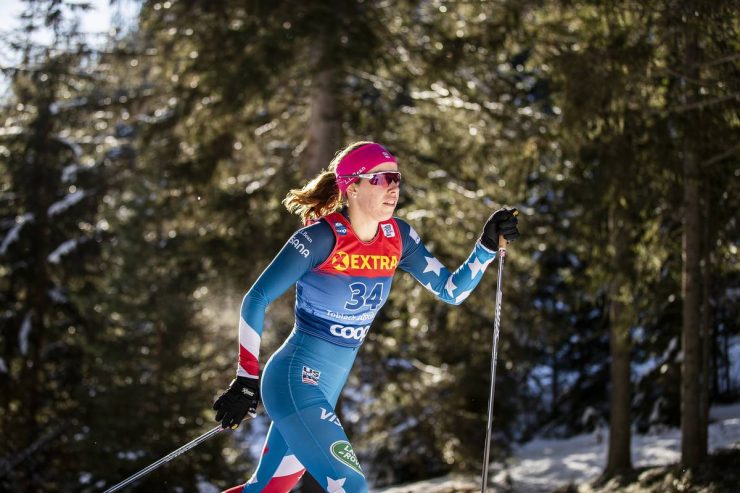
The author, Katharine Ogden, is a Junior at Dartmouth College. She recently completed the 2019-2020 Tour de Ski. Ogden is a decorated skier. You can read more about her ski career here.
By: Katharine Ogden
01/06/20
The Tour de Ski is an iconic set of world cup races. It tests athletes in every way and pushes you to your limits physically and emotionally. Seven races over the course of nine days evokes giggles, tears, and often sudden, urgent needs for gelato. In reflecting and trying to figure out what to say about the whole whirlwind I realized that in order to fully express how I feel about this accomplishment I need to provide some backstory. My ski career has taken a few turns over the past few years that made it pretty hard to imagine myself climbing up Alpe Cermis on the final day of the Tour de Ski.
Just a few years ago, I wasn’t even sure if I would keep ski racing at all.
In the spring of 2017, I was diagnosed with an anxiety disorder, a conclusion that decidedly changed my life for the better. During the year leading up to my eventual diagnosis I experienced near constant anxiety symptoms that made it hard for me to sleep and even harder to eat enough. These new, extreme feelings of fear and a lack of control also made traveling and racing suddenly very hard for me. I made it through period one of the Super Tour, U.S. Nationals and World Juniors Championships in Park City that year by hiding in my room and only skiing as much as I absolutely had to. I wasn’t eating enough because the anxiety made me constantly nauseous and subsequently I had very little energy.
Once the WJC races were over, I was exhausted. By the end of January, I was no longer racing or training at all. I declined all of the trips I had planned on doing for the rest of the winter and completely succumbed to my anxiety. I spent weeks barely leaving my bed before I finally got up the combination of courage and desperation that it took to make my first appointment with my psychiatrist, Dr. Stanger. She explained to me that I could learn to manage the feelings of terror I felt, and she gave me a prescription for anxiety medication that almost immediately changed my life. Before meeting Dr. Stanger I didn’t believe that things were going to get better for me. I didn’t think that I would ever be strong enough again to go to college or continue ski racing.
I have spent the past three years since that winter healing and learning to trust myself again. In skiing for the Dartmouth Ski Team, I was able to relearn to love ski racing and start the process of separating in my mind the concept of traveling and racing from the anxiety that it had induced.
College skiing is a perfect combination of a fun and laid back scene, while still being competitive. It allowed me to take the time that I needed to heal and learn how to manage my disorder. I was able to take a step back from international competition and simply enjoy skiing and racing on all of the beautiful New England trails where I first learned to love the sport.
Now, this year, I am feeling more confident and happier than I have in a long time. My only goal for this season was to smile on every start line and so far, I have been accomplishing it. I am learning to trust myself and to be okay with forging my own path through this sport and through life. Finishing the Tour de Ski is something that I am extremely proud of. But, I am so much prouder of the fact that I truly enjoyed the entire experience. I smiled before every race and even during a few of them.
I am sharing this story in hopes that I can help to de-stigmatize athletes talking about mental health. Finishing the Tour de Ski has been a dream of mine for a long time. It would not have been possible for me to accomplish it without the hard work that I have put into learning to manage my anxiety disorder.
From the Editors: if any person reading this needs assistance, please seek help and guidance from a personal physician or other health professional, your school health service, parent/guardian, or trusted coach.



